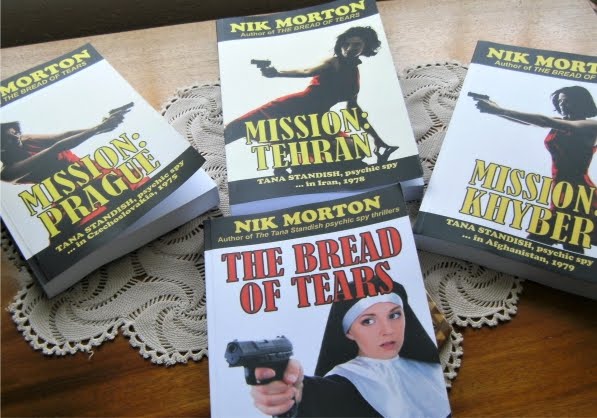HELL IS TOO CROWDED
This is an early Jack Higgins novel, originally published
under his real name Harry Patterson in 1962, reprinted by Fawcett in 1976 and
reissued here in 1977 with the name-change and the strap-line ‘by the author of The Eagle Has Landed’.
It’s a pot-boiler and reveals that Higgins was learning his trade.
Matt Brady was inebriated when he met the woman; he was ‘caught
between the shadow lines of sleep and waking when strange things fill the mind’
(p5). One wonders if Higgins was alluding to the Joseph Conrad book The Shadow Line (1917) which depicts the
threshold of a young man entering adulthood at sea. The woman was wearing a
trench-coat and a scarf ‘peasant-fashion’.
‘A ship moved down the Pool of London sounding its foghorn like the last of the dinosaurs lumbering aimlessly through a primeval swamp, alone in a world that was already alien.’ (p5) Here, Higgins might be referencing Ray Bradbury’s classic short story ‘The Foghorn’ (1951).
Once in the woman’s apartment, he accepts a drink and abruptly
passes out. When he comes to, the police are in the room and the woman is dead –
her face brutally damaged… Brady is sent to prison for life. He must escape, however,
to prove his innocence, which he does manage with some inside help. The trail
leads him to several individuals, one of whom is Das who is a proud owner of a Ming
vase among other items. In his desperation to get answers, Brady threatens to
destroy the valuable vase. (This will be echoed in The Dark Side of the Island when the doctor Van Horn is threatened
by the Nazi’s in a similar way).
Brady is befriended by Anne, a young woman, the daughter of a friend who has died. She believes in his innocence. The story behind the woman he was accused of murdering is revealed about three-quarters through the book; after which it’s a case of tracking down the real murderer.
There are several deaths before the denouement is reached.
The book was originally published in the US, I assume, since there were references to ‘color’, ‘hood’ of a car instead of ‘bonnet’, and ‘sidewalk’. Higgins may have been attempting an American point-of-view since Brady was from the States; however, there were other instances of the spelling ‘colour’. These were the days when publishers actually employed people to change the trans-Atlantic vocabulary as appropriate; now, they tend not to bother. None of this spoils the story-telling, which is page-turning.
THE DARK SIDE OF THE ISLAND
This is another early Jack Higgins novel, originally
published under his real name Harry Patterson in 1963 and reissued here in
1989.
It’s a pot-boiler and reveals he was still learning his trade.
Seventeen years after fighting in the Second World War Hugh Lomax
returns to the Greek island of Kyros. The last time he was here he’d been on a
secret mission to destroy a vital Nazi radio station. Betrayal and capture
followed and he barely escaped with his life. Now, he was back to find out the
truth.
The Greek islanders haven’t forgotten him and indeed blame him for talking under Nazi interrogation and costing many innocent lives…
The book is split into three parts: 1) Lomax’s return and being confronted by antagonistic islanders; 2) Flashback to the actual landing on the island and the sabotage and escape and capture; 3) Lomax’s life threatened by the islanders while he seeks the truth.
There’s Katina, a local girl, who wears a scarf ‘peasant-fashion’.
She’d been a teenager when they’d met in the war; now she was a mature woman
who believes in Lomax’s innocence. Resident ex-pat Van Horn is a successful
author and doctor; he’d been useful doctoring during the war. Van Horn was also
an archaeologist and had a valuable collection, some of which was broken by the
Nazi Steiner. Then there are the few Greek men who survived the Nazi depredations:
Alexias, Dimitri, Nikoli, among a few others – any one of whom might have been
the traitor…
The story is fast-paced, workmanlike, but the denouement is no great surprise.
Definitely, one for the Jack Higgins completists.
Editorial comments:
Some of Jack Higgins’s favourite words and phrases that are
often repeated: ‘somehow’, ‘somewhere’, ‘moment’, ‘a frown on his face’. And: ‘heavy’
– ‘He pushed open the heavy glass door, crossed the heavy carpet soundlessly…’ (TDSOTI,
p112).
These were early novels and his apprenticeship eventually paid off with his thirty-sixth novel, The Eagle Has Landed in 1975. The lesson here is blatantly clear: keep writing and improving.































